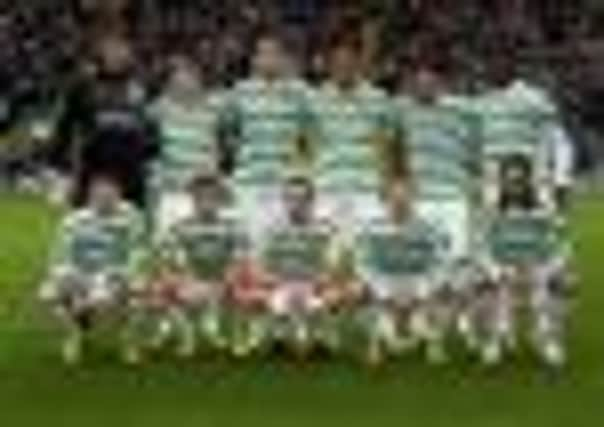Andrew Smith: Celtic’s class of 2012 possess more talent and potential than their 2008 forebears


The punters in the stands certainly were all of that. Most of them turned up in time to hear Susan Boyle give a glass-shattering rendition of You’ll Never Walk Alone.
The talent show phenomenon’s pitch approached that of dog whistle as the two sets of players made their way out of the tunnel. Maybe such an eardrum assault accounted for the slight disorientation that the home side exhibited in the early stages.
Advertisement
Hide AdAdvertisement
Hide AdThere were moments during that period in which Lennon’s young side exhibited signs that they were more fearful than fearless. Predictably that gave way to an assurance and dynamism once Gary Hooper’s 30th minute goal had parted the sea in Celtic’s search for the Promised Land. Such certainty follows what seems an eternity in exile from the Champions League group stages for the club’s power-brokers and followers.
In reality, although it is four years in calendar terms, the east end of Glasgow has been devoid of these fabled nights for only three seasons.
A 2-0 home victory over Villarreal in December 2008 is the last Champions League game in the tournament proper contested by Celtic, their only group win that year an utterly meaningless outcome.
Rendered so by the fact that the Scottish title holders were already condemned in their four-team section as a consequence of losing away to tiny Aalborg in excruciating circumstances. A reminder that participation in the competition can depress as much as it can uplift.
Celtic have changed beyond all recognition since then, and therefore no psychological scars will be carried forward. Only Scott Brown and Georgios Samaras survive from the club’s last Champions League squad, which was managed by the seasoned Gordon Strachan
His contemporary equivalent, the learning-on-the-job Lennon, without good reason, rarely fails to let it be forgotten how youthful is the personnel that he will require to send into battle against some of the continent’s heavyweights. The status of Brown and Samaras then and now reflects that. With the Scottish midfielder and the Greek both 27, they defer only to 28-year-old Kris Commons when ranking the elder statesmen of the current Celtic first XI. Four years ago, five of the team were 28 or older.
The side Lennon sent out tonight had an average age of just under 24. For Strachan’s preferred selection of 2008, the figure was 26. That is a significant difference. In essence, Commons is the only player in what are considered a footballer’s peak years. The age range commonly placed on this is between 28 and 32. With Adam Matthews 20, James Forrest and second scorer Victor Wanyama both 21, and Fraser Forster and Gary Hooper each aged 24, Lennon has a clutch of players still in the coltish bracket.
Aside from the 23-year-old Aiden McGeady four years ago, Celtic were very much composed of players as good as they were ever going to be: Paul Hartley then 31, Shunsuke Nakamura 30, and Jan Vennegoor of Hesselink 29. Interestingly, while Strachan’s team cost £15.6m in transfer fees, even in these more austere times Lennon’s starting line-up last night could be priced at £12.6m. Mind you, with Brown common to both, the £4.4m Celtic paid Hibernian for his services in 2006 ensures the parallel seems closer than is actually the case.
Advertisement
Hide AdAdvertisement
Hide AdWhat excites seasoned Celtic watchers is that Lennon appears to have assembled a squad with more talent, and, by their age profiles, greater potential, than that of the club’s last Champions League incarnation four years ago. Forrest and Wanyama seem destined for playing riches beyond any of the last Champions League-contesting Celtic side. Granted the core of this Strachan squad took the club to the last 16 of the competition on the previous two occasions.
It is surely asking too much to expect that they will survive the group stages this year, but their efforts should not be compared to those days. A win and two draws would place them on a level pegging with the class of 2008. What would set them apart would be notable results on the road. Celtic lost all three of the away games that season – as they had the previous year, and the year before that.
The club go into this season’s Champions League on the back of four wins on the spin, victories in Helsingsborg and Helsinki contributing to a four-game unbeaten run on foreign soil. In terms of Lennon’s call for the current crop to carve out benchmarks in Europe, this isn’t a half bad starting point.
Not since they reached the final of the Uefa Cup in 2003 have Celtic proved so durable, but, even during that Martin O’Neill era, they never won a Champions League away game. What tonight’s qualification provides is the lolly to bring in a central defensive reinforcement to allow them to dare consider that possibility. Auxerre’s Willy Boly is the principal target.
One thing that causes disquiet when comparing Celtic’s 2012 vintage with the 2008 variety is that the limitations betrayed by Gary Caldwell and Stephen McManus have hardly been consigned to history when their successors are Charlie Mulgrew and Kelvin Wilson. The Champions League can be cruel on such combos.